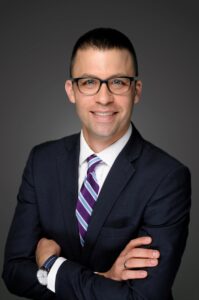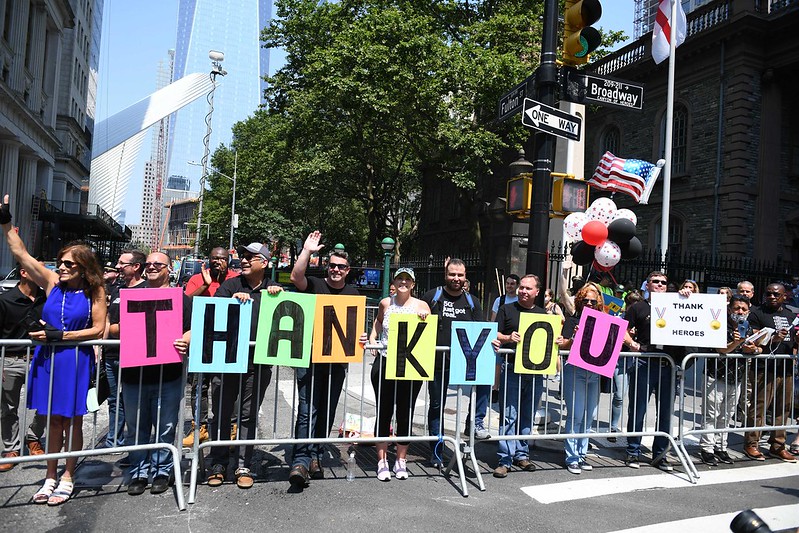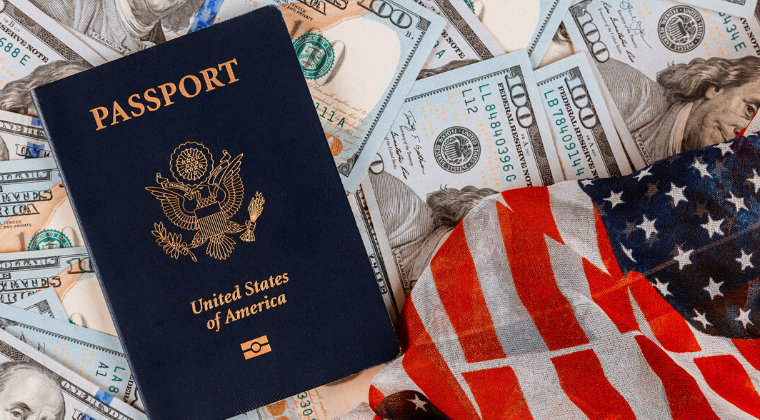by Natasha B. | Dec 6, 2021 | News, Workers' Rights

Anthony Damelio, ’22
Catholic Migration Services is pleased to announce that Anthony Damelio, a student at Fordham University School of Law, has been selected as a 2022 Skadden Fellow to work with the Workplace Justice team beginning in the fall of 2022. A competitive program that selects 28 fellows each year to provide civil legal services to low-income clients, the Skadden Fellowship provides two years of funding to legal services organizations throughout the country to help launch the careers of public interest lawyers.
Anthony served as a 2020 summer legal intern with the Workplace Justice team. Prior to law school, he was Deputy Director of New Immigrant Community Empowerment (NICE), an immigrant worker center and close community partner of Catholic Migration Services. During law school, Anthony has served as a Stein Scholar for the Public Interest and interned at Kakalec Law PLLC, a small worker-side employment firm, and the Housing and Worker Protection Bureau of the Queens District Attorney. As a Skadden fellow, Anthony will work with NICE and the Coalition for Immigrant Families to implement the New York Health and Essential Rights Act (NY HERO Act) signed into law on May 5, 2021. The law mandates extensive new workplace health and safety protections in response to COVID-19. Aside from mandating clear COVID-related protections, the NY HERO Act also provides workers the right to form workplace safety committees, with strong protections and a private right of action if their employers retaliate.
“This is an outstanding achievement for Anthony and a well-deserved recognition of the work of Catholic Migration Service’s Workplace Justice Team. We are thrilled to have Anthony, a dedicated and experienced worker advocate, join our team. Through Anthony’s project, Catholic Migration Services will strengthen its relationship with local worker centers and harness the new protections under the NY HERO Act to protect and empower vulnerable workers,” said Magdalena Barbosa, Managing Attorney with the Workers’ Rights Program.
The 2022 Class of Skadden Fellows hail from 19 different law schools and will be partnering with legal service nonprofits across the country. The program provides two-year fellowships to talented young lawyers to pursue the practice of public interest law on a full-time basis and is currently working in public interest in 42 U.S. states
“I am deeply grateful to the leadership of Catholic Migration Services, New Immigrant Community Empowerment, and the Coalition for Immigrant Families for supporting this project that seeks to empower i“mmigrant workers to reclaim their new workplace rights,” said Anthony Damelio, Prospective Skadden Fellow Class of ’22 for Catholic Migration Services. “In deciding to fund this work, the leaders of the Skadden Foundation saw the impact of Catholic Migration’s powerful model of collaborative legal representation that works closely with community partners to advocate for low-wage workers who are exploited by their employers. I look forward to getting started with the incredible team at Catholic Migration Services!”
by Natasha B. | Nov 12, 2021 | Legal Services, Press Releases and Statements, Temporary Protected Status (TPS)
Peze la pou tradui nan Kreyol Ayisyen
What is Temporary Protected Status (TPS)?
- Temporary Protected Status is an immigration status available to some people from countries the Secretary of Homeland Security has designated as “unsafe to return to” for various reasons, such as civil war, political unrest, natural disaster, etc.
- TPS is a temporary immigration status that may be renewed for as long as the TPS designation is in place
- People with TPS:
- May not be deported from the United States
- Can obtain employment authorization cards (“work permits”)
- Can obtain permission to travel in some situations(“advance parole”)
What Temporary Protected Status is NOT:
- TPS is not, by itself, a path to permanent residence, citizenship, or other long-term immigration status
- TPS does not stop an individual from seeking other immigration benefits (i.e., asylum, permanent residence, other nonimmigrant status)
- TPS is not an absolute protection against deportation
- If an individual becomes ineligible for TPS due to criminal convictions or any other reason, the individual may be deportable
- TPS is not permanent
- TPS designations may last for many years, as it has with Haiti, but it cannot become permanent
- If the unsafe situation in a TPS country resolves itself, the Secretary of the Department of Homeland Security (DHS) may end the TPS program for that country
Who is eligible for the newly announced Haitian TPS?
- Haiti was designated for TPS on August 3, 2021
- The general eligibility requirements for Haitian TPS are:
-
-
- Must be a national (citizen) of Haiti and enter the United States as a Haitian national
-
-
-
- If you entered the United States with a non-Haiti passport or claimed citizenship from another country, you are likely not eligible for Haitian TPS
-
-
- Must have resided in the United States since July 29, 2021
-
-
-
- Have you been living in the US since that date?
-
-
- Must have been continuously physically present since August 3, 2021
-
-
-
- Were you physically in the United States since that date?
-
-
- Must not have firmly resettled in another country before coming to the United States
-
-
-
- If you were offered or received a permanent or long-term immigration status in another country before arriving in the United States, you may be ineligible for TPS.
- If you think you may have firmly resettled, you should speak with an immigration attorney before applying for TPS.
-
-
- Must not have certain criminal convictions
-
-
-
- This is a complex area of immigration law. Speak with an immigration attorney if you have concerns about prior convictions.
How do I apply for Temporary Protected Status?
- The fee to apply for TPS is $545($135 if you do not want a work permit). This fee is the same for all TPS applicants right now, even if you have had TPS previously
- This filing fee may be waived in certain circumstances (i.e., low-income, public assistance recipients)
- FormI-821, Application for TPS, must be filed to receive TPS
- FormI-765, Application for Employment Authorization, is required to receive a work permit
- Documentation showing you meet the eligibility requirements must be submitted:
- Proof of Haitian citizenship (passport and/or birth certificate)
- Proof you have resided and been present in the United States
- Visa stamp or other entry records, lease, bills, school, medical and/or employment records, bank statements, etc.
- If you have been arrested or think you may have firmly resettled, you may need to provide additional documentation. You should speak with an immigration attorney if you are unsure
- Where and how to file for TPS can be found at the United States Citizenship and Immigration Services website:
- gov/humanitarian/temporary-protected-status/temporary-protected-status-designated-country-haiti
If you have any questions or concerns, please call Catholic Migration Services in Brooklyn at (718) 236-3000 or in Queens at (347) 472-3500 between 9:00 a.m. and 5:00 p.m. from Monday through Friday.
Click here to download this update as a PDF: Immigration Update Pertaining to Haiti and the Designation for Temporary Protected Status (TPS)
by Natasha B. | Aug 30, 2021 | News, Workers' Rights

Photo: Ed Reed/Mayoral Photography Office
Thomas Power, senior staff attorney with the Workers Rights Program at Catholic Migration Services recently authored an op-ed with colleagues Sarah Leberstein from Make the Road New York and Katisha Andrew from TakeRoot Justice, on the need for more funding for employment legal services.
“For low-wage essential workers, obtaining private counsel is prohibitively expensive. Often, the worker’s damages from a case are less than the actual cost for a private attorney to bring the case forward.” Created in 2019, New York City’s Low-Wage Worker Initiative (LWWI) is the only dedicated city-funded program that provides free, individually-tailored, employment civil legal services and case management support to workers in New York City’s low-wage industries.
by Natasha B. | Jul 15, 2021 | News, Workers' Rights
Presione aquí para la versión en Español.
On April 19, 2021, New York State passed the Excluded Workers Fund (EWF), which will provide financial relief to undocumented individuals who suffered income loss during the pandemic and were unable to get unemployment insurance benefits or other federal pandemic relief benefits. Under the EWF, eligible New Yorkers can receive a one-time cash payment in the amounts of either $15,600 or $3,200 depending on the type of work documentation and earning applicants can provide. Applications will be available in August 2021.
How do I prove my identity?
All eligible applicants must show proof of identity and proof of New York State residency. The following non-expired items can be used for both:
- New York State driver license or New York State ID
- IDNYC
If applicants do not have these items, they can show proof of identity by providing the following documents:
Proof of Identity (total of 4 points needed):
- Non-U.S. passport (3 points)
- New York State inpatient ID issued by State Office of Mental Health (2 points)
- Marriage certificate (1 point)
- Divorce decree (1 point)
- New York State inpatient photo identification card (2 points)
- NYC Department of Parks and Recreation card (1 point)
- Non-U.S. birth certificate (1 point)
- Non-U.S. photo ID card (1 point)
- Diploma or transcript from a high school, college or university in the U.S (1 point)
- Any other document the Department of Labor announces it will accept (3 or fewer points only)
How do I prove my residency in New York State before March 27, 2020 and currently?
- Copy of a utility bill
- Bank or credit card statement
- A current lease, mortgage payment, or property tax statement
- Letter addressed to you from the New York City Housing Authority
- Letter addressed to you from a homeless shelter that states you are living at the shelter now
- Letter to you from a non-profit that provides services to the homeless
- Any other document the Department of Labor announces it will accept
You do not need all of the documents listed above, but it may be best in preparation for the application process to gather as many as possible.
How do I prove my work history?
There are two tiers of benefits. The amount of benefits you receive depends on which documents related to employment and earnings you may have.
Tier 1 – $15,600 total benefit
- Tax return for 2018, 2019 or 2020 using a valid Individual Taxpayer Identification Number (ITIN); OR
- Six weeks of pay stubs or wage statements from the last 6-month period before the date you lost income due to the
COVID-19 pandemic; OR
- Letter from an employer showing dates of employment and why you are no longer working; OR
- W-2 or 1099 form from 2019 or 2020; OR
- Wage notice that shows employment from some time before the date you lost income due to the COVID-19 pandemic.; OR
- Any other documents the Department of labor announces it will accept.
Tier 2 – $3,200 total benefit
- For applicants who cannot provide the documents required for tier 1, but who are otherwise eligible for the Excluded Workers’ Fund, you can receive a smaller sum of benefits if you can show alternative proof of work-related eligibility, as determined by the Department of Labor.
How do I protect myself from fraud?
You cannot currently apply for the EWF. The process will be administered by the New York State Department of Labor and applications are scheduled to be available in August. You should not have to pay a lawyer or anyone else for assistance in completing this application. Be careful to not hand over your personal information to notarios.
Do you have additional questions?
If you have questions, call the Catholic Migration Services Workers’ Rights Hotline at (877) 525-2267.
Download the Update on the New York State Excluded Workers Fund as a PDF.
by Natasha B. | Jul 15, 2021 | Citizenship, Immigration, naturalization, News
 Jose M. Leon, a supervising attorney with the Naturalization Program in the Immigration Unit at Catholic Migration Services was recently interviewed by the American Bar Association Journal about the Citizenship Loan Program, a partnership with New York Lawyers for Public Interest (NYPLI) and Hebrew Free Loan Society. The new initiative offers interest-free loans to permanent residents who live in one of New York City’s five boroughs, Westchester or Long Island.
Jose M. Leon, a supervising attorney with the Naturalization Program in the Immigration Unit at Catholic Migration Services was recently interviewed by the American Bar Association Journal about the Citizenship Loan Program, a partnership with New York Lawyers for Public Interest (NYPLI) and Hebrew Free Loan Society. The new initiative offers interest-free loans to permanent residents who live in one of New York City’s five boroughs, Westchester or Long Island.
Jose says most of his clients are low income. Whenever he gets a new client, he determines if they are eligible for a fee waiver. If they are not, he tells them about the loan program. “I don’t think these people would be able to become U.S. citizens unless a program like this existed,” Leon says.
Read the full story in the ABA Journal: Lawyers’ group helps ease path to citizenship for low-income New Yorkers with interest-free loans
The Citizenship Loan Program is a collaboration between the Hebrew Free Loan Society, Catholic Migration Services, and New York Lawyers for the Public Interest. Lean more here.





